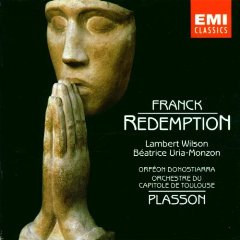Cesar Franck - Rédemption (1994)
Cesar Franck - Rédemption (1994)

0. Introduction [03:57] Ia. Chœur Terrestre : 'Que le jour monte ou s'abaisse' - Chœur [05:48] Ib. Chœur Terrestre : 'Ah! Malheur aux vaincus' - Récitant seul [01:41] II. Récit et Chœur des anges : 'Mais, je vois s'éclairer' - Récitant / Les Anges [04:39] IIIa. Chœur, récit et air de l'archange : 'Où mènent vos chemins' - Chœur [01:19] IIIb. Chœur, recit et air de l'archange : 'Les rois dont vous vantez la gloire' [08:46] IV. Chœur général : 'Devant la loi nouvelle'- Chœur [04:22] V. Morceau symphonique [13:56] VIa. Chœur d'hommes : 'Où sommes-nous?' [04:22] VIb. Chœur d'hommes : 'Toujours le chant moqueur!' - Récitant seul [01:28] VII. Chœur des anges : 'Et vous, séraphins' - Récitant / Chœur [07:49] VIIIa. Air de l'archange : 'Le flot se lève' - L'archange [05:40] VIIIb. Air de l'archange : 'Prier! - Le pouvons-nous?' - Récitant seul [02:10] IX. Chœur général : 'Seigneur, Seigneur, oublie' [07:20] Lambert Wilson - récitant Béatrice Uria-Monzon - mezzo-soprano Orféon Donostiarra Orchestre du Capitole de Toulouse Michel Plasson - conductor
César Franck’s Rédemption is not easily pigeonholed. It’s not exactly an oratorio, even though it employs soloists and choir and concerns itself with Godly matters. Franck himself referred to it as a Poème-Symphonie, but this doesn’t really nail it either, especially when you consider the extensive narration. Whatever it is, it represents Franck at his most ambitious–and heavy-handed. The text is the sort of quasi-religious prose endemic to 19th century art, the same kind that’s found its way, though in a more rarified form, into the current epoch in works by composers like John Tavener. Interestingly, Franck’s musical language here is closer to Berlioz than to his own Psyche, with its uniquely Franckian chromatic permutations.
In keeping with tradition, the composer assigns celestial music to the women’s voices (The Angels), but the passages for the Earthly Choir and Men’s Choir are also imbued with a sense of the ecstatic. Unfortunately, the piece tends to drag at times, and the extensive narration certainly adds to its longueurs. None of this can be blamed on the performers, however. Michel Plasson presents the music with sensitivity and persuasiveness, securing first rate playing from the Toulouse Orchestra. Béatrice Uria-Monzon sings radiantly as the Archangel, while Lambert Wilson delivers stylish and impassioned narration in French. The original 1994 EMI recording was well balanced, and sounds just fine in this remastering. Get this if you find yourself in serious need of some Gallic profundity. ---Victor Carr Jr, classicstoday.com
download (mp3 @320 kbs):
yandex mediafire ulozto cloudmail.ru bayfiles








